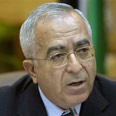
Salam Fayyad
צילום: AP
Fayyad: We need to will Palestinian state
Following Israel's silence, Fatah's criticism of his plans to set up de facto Palestinian state within two years, Prime Minister Salam Fayyad give interview to Newsweek, saying, 'Who else is going to build it if we don't? We should quit accepting things as fate'
Some two weeks after going public with his ambitious plans of establishing a de facto Palestinian State within two years, Palestinian Prime Minister Salam Fayyad of Monday said he was baffled as to Israel's displeasure and silence over his plans.
In an interview to Newsweek, Fayyad said he did not understand why Jerusalem was so unwelcoming of his initiative, and said the Israelis were missing the point.
"If you look at all the variables around us, we really don't have control over most of them," he told Newsweek.
"This is the one element that lends itself to some measure of control. Who else is going to build it if we don't? We're not sitting on our hands waiting. We need to will this state if we want it. We should quit accepting things as fate."
In a 60-page document titled: "Palestine: Ending the Occupation – Establishing the State", the minister detailed his plan of action for the next two years aimed at establishing a de facto state.
The document detains the national goals and political principles of the new state, and includes chapters on the formation of institutions, government plans, economic and social development plans, and infrastructure development.
Among other things, Fayyad wrote that the new state will be democratic, modern and sovereign within the 1967 borders.
Jerusalem will serve as the state's capital, and the problem of the Palestinian refugees will be solved according to UN Security Council Resolution 164, which calls for a just solution.
In addition, Fayyad outlined the government offices to be set up, and called for the formation of a Palestinian stock exchange, an airport in the West Bank, and a land administration to handle land registration in the state.
Fatah sources slammed Fayyad's plan, and sources from within the party were critical of the prime minister's speech they said stepped on President Mahmoud Abbas' toes.
They accused Fayyad of continuing to position himself as a statesman rather than a professional executive.
It is no secret that many in the international community would like to see Fayyad as the next Palestinian leader, which has been a cause for concern among a growing group in Fatah.
Sources in the party are beginning to realize that after losing power over the Gaza Strip to Hamas, a powerful force is emerging in the West Bank as well, and continues to gain steam and threaten the party's hegemony.










